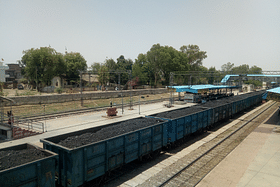The assessment reveals that logistics cost incurred for the movement of coal via the RSR route is over 60 per cent costlier than the ARR, making coastal shipping for coal movement an unviable option.
The transportation of coal to power houses, through coastal shipping route is costing much more than rail routes, according to a survey done by the Indian Railways.
According to the analysis, due to the coal movement on shipping routes in the past five years, Indian Railways has lost a total revenue of approximately Rs 1,382.90 crore.
It also analysed the transit time for the movement of coal from coal mines to thermal power plants via rail-ship-rail (RSR) and all-rail-route (ARR).
The assessment highlights that the ARR route is cheaper and incurs less time when compared with the RSR route, for the movement of coal.
In order to reduce the total logistic cost of coal transportation, Railway Ministry has undertaken the task of analysing and comparing the movement of domestic coal through the RSR route with the conventional ARR mode.
The assessment reveals that logistics cost incurred for the movement of coal via the RSR route is over 60 per cent costlier than the ARR, making coastal shipping for coal movement an unviable option.
The movement of coal in India is primarily through the Railways, as the country has an extensive rail network that connects coal-producing regions to coal-consuming regions and ports.
According to the Ministry of Coal, around 80 per cent of the country’s power house coal and 65 per cent of the total coal produced is transported by the Railways.
The Railways survey report aims to compare all ARR and RSR routes, for evacuating coal from mines and supplying it to power plants.
As per the data, coal from mines to ports to facilitate Rail-Ship-Rail movement takes place primarily through Paradip Port, Dhamra port, Vishakhapatnam Port and Gangavaram Port.
In FY 22-23, these four ports carried a total of 50.40 MT coal with more than 43 MT transported via Paradip Port.
Through these ports, India also exports coal to a few countries like Malaysia, Indonesia and Bangladesh in small quantities.
Domestic coal which is received at the port and taken to the hinterland via railway is due to the RSR movement of coal.
The data suggests that domestic coal is generally taken to four ports — Ennore Port, Karaikal Port, Krishnapatnam Port (private) and Marmagao Harbour by coastal shipping route.
It is evident that major RSR movement of coal has taken place only on the Eastern Coast of India.
The coal from these ports generally serve the power stations including Karnataka Power Corporation, Andhra Pradesh Generation Corp, Tamil Nadu Generation and Distribution Corp, National Thermal Power Corporation and Tamil Nadu State Electricity Board.
The Railway survey also examined the logistics costs and time incurred for coal movement in the ARR from Korba (SECL) to Ukai Thermal Power Plant are lower compared to the RSR route.
The time required for coal movement in the RSR route from Talcher to the Ukai plant is more than twice the time required for ARR.
The survey has also compared the cost of movement of thermal coal from IB Valley coal mine of Mahanadi Coalfields Limited to Mettur Thermal Power Plant, located in Tamil Nadu via both routes ( RSR through Gangavaram Port — as the load port and Karaikal Port as the destination port).
The logistics cost was analysed between these two routes considering the first and last-mile connectivity rail costs, shipping charges, and freight handling charges at ports.
It was found that Mettur thermal power plant has paid approximately Rs 286.31 crore extra in the last five years to procure the coal via the RSR route.
Hence, the survey has recommended that in the interest of the national economy and Indian Railways, it should move coal via the ARR.
All-Rail-Route is more cost-effective:
RSR may be cheaper only in select cases, where there is a coastal power plant and the mine from which the coal is transported is also closer to the port.
All-Rail-Route is efficient:
The unit also undertook transport time analysis for select origin-destination pairs. It was apparent from the study that the ARR is more time efficient.
Furthermore, Indian Railways has made significant developments to increase track capacity, indicating no capacity-related issues in transporting coal solely by the Railways.
Negative impact on the Economy:
It is crucial to consider the larger context and objectives of the National Logistics Policy. This policy aims to reduce logistics costs and deliberately promoting coastal shipping through the RSR route would not align with this objective.
Also, the increased price of coal would increase power tariffs and impact the general population. Thus, the RSR route would increase the overall logistics cost of coal movement and subsequently impact the national economy.
Considering these factors, it is clear that the movement of coal by the RSR route is causing net loss to the Railways and the national economy, it may be discouraged with immediate effect, said the survey.
The survey has strongly recommended that the Railways should expedite infrastructure construction and undertake more capacity enhancement works like multi-tracking, doubling and DFC projects to increase goods loadings, including coal for power utilities.
It has suggested that Indian Railways must correspond with power companies and power utilities to move coal through the more efficient ARR mode, instead of the RSR.


